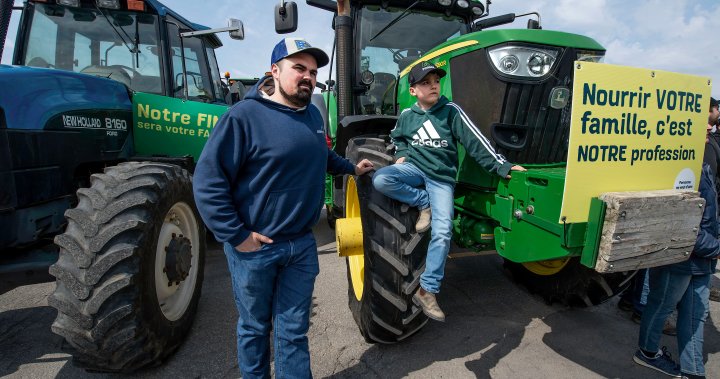
Quebec farmers have been protesting since December. Is anyone listening?
Global News
Upset about high interest rates, growing paperwork and heavy regulatory burdens, protesting farmers have become a familiar sight across Quebec since December.
On Monday morning in Sherbrooke, Que., dozens of tractors slowly rolled along a stretch of road between the regional offices of Quebec’s farmers association and the Agriculture Department a few hundred meters away.
“It’s pretty hard to get farmers out of their farms, because they’ve got so many hours to put in, but to see them going out, it means that there is really something going bad in farming right now,” said Benjamin Boivin, a corn and wheat farmer in Quebec’s Estrie region, east of Montreal, who was out protesting on Monday.
Government aid programs no longer match the needs of the province’s farmers — only one per cent of Quebec’s provincial budget goes to agriculture, and most of that money funds a tax credit to help farmers pay municipal taxes, he said.
Martin Caron, president of the official body that speaks for Quebec farmers — Union des producteurs agricoles, or UPA — said the net income of farms dropped by an average of 50 per cent last year, largely due to rising interest rates and the high cost of fuel and equipment.
Burdened with diminishing profits, farmers are also being forced to comply with an increasing amount of paperwork. Forms required to expand farmland can be 100 pages long, he said, and it can take months to get new buildings approved. That’s in addition to the training farmers are required to take to learn about specific crops.
“When you’ve got bureaucrats coming to your place to tell you how to do your job, which you studied, it doesn’t work anymore for the producers,” Caron said in an interview.
Since 2015, farmers have paid the government more than $400 million in environmental fees, which are charged on a range of plastic products, such as containers of seeds, fertilizer and pesticides. Caron said he wants that money returned to farmers to help them adapt to climate change.
Those fees, which don’t exist elsewhere in Canada or internationally, have put Quebec farmers at a commercial disadvantage, he said.
